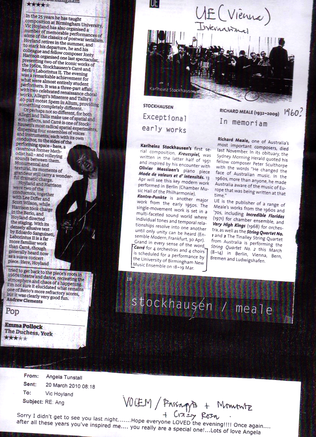Composer
Squares Circles Labyrinths Review
Productions
Squares Circles Labyrinths
Andrew Clements, The Guardian, 2010
In the 25 years he has taught composition at Birmingham University, Vic Hoyland has also organised a number of memorable performances of some of the classics of postwar serialism. Hoyland retires in the summer, and to mark his departure, he and his colleague and fellow composer Jonty Harrison organised one last spectacular, presenting two of the iconic works of the 1960s, Stockhausen's Carré and Berio's Laborintus II. The evening was a remarkable achievement for what were almost entirely student performers. It was a three-part affair, with two celebrated renaissance choral works, Allegri's Miserere and Tallis's 40-part motet Spem in Alium, providing something completely different.
Or perhaps not so different, for both Allegri and Tallis make use of spatial and echo effects, and Carré is one of Stockhausen's most radical spatial experiments, dispersing four ensembles of voices and instruments, each with its own conductor, to the sides of the performing space - here, a cavernous former Methodist hall - and volleying sounds between them. Monumental and textural, its moments of grandeur still carry a wonderful dramatic charge.
Hoyland and Harrison were two of the conductors, together with Lee Differ and Scott Wilson, while Harrison took charge in the Berio, and Hoyland directed the staging. With its densely allusive text by Edoardo Sanguineti, Laborintus II is a far more familiar work than Carré, though generally heard now as a suave concert piece. Here. Hoyland tried to get back to the piece's roots in 1960s theatre and dance, recreating the atmosphere and chaos of a happening. I'm not sure it elucidated what remains one of Berio's more refractory scores, but it was clearly very good fun.
Andrew Clements
